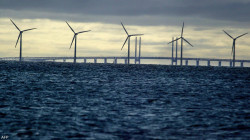XV World Forestry Congress: a make-or-break chance

Shafaq News/ With a picturesque phantasmagoria and immaculate dancing children, the World Forestry Congress (WFC) kicked off in the South Korean capital, Seoul, this week. The congress, in its 15th convention, pivoted toward a make-or-break chance to save the planet from the most calamitous effects of deforestation.
After a year-long delay due to the COVID-19 pandemic, some 12,500 people representing scientific, professional, and environmental bodies from 144 countries registered for the week-long event.
Speakers at the world's largest gathering of forestry stakeholders in Seoul stressed immediate action to curb deforestation and restore nature, saying time is running out to achieve Sustainable Development Goals (SDGs) by 2030.
Global cooperation and a sustainable future were some of the most frequently mentioned concepts by representatives of governments, academia, civil society, international organizations, and private businesses at the meeting held for the first time in the south Korean capital.
Motivation and fear:
The motivational tone of the keynote speakers was barely capable of masquerading the underlying fear from the sprawling scourge of deforestation.
The Food and Agriculture Organization (FAO) manifested the same motivational tone the organizers of the world's largest Forestry event chose to adopt.
"The balanced, simultaneous pursuit of these pathways can help address the crises facing people and the planet while also generating sustainable economic benefits, especially in (often remote) rural communities," FAO Director-General QU Dongyu writes in the foreword to the report, subtitled "Forest Pathways for Green Recovery and Building Inclusive, Resilient and Sustainable Economies" and launched at the Congress.
"Forests can play a key role in restoring ecosystems with the aim of a better life for all," the FAO Director-General said.
However, the congress comes as humanity faces multiple, interconnected, and often overlapping challenges, including the climate crisis, biodiversity loss, conflicts, the COVID-19 pandemic, and soaring food prices, which are hitting the poorest the hardest as they face greater exposure to the negative impacts.
Today, more than 800 million people still suffer from hunger, and three billion cannot afford a healthy diet, according to the FAO.
The FAO report projected that the global population will increase from 7.7 billion people in 2019 to 9.7 billion people in 2050, and the annual global consumption of natural resources such as biomass, fossil fuels, metals, and minerals could more than double by 2060 – raising the prospect of further environmental damage caused by increased production, consumption and waste generation.
Meanwhile, deforestation and forest degradation continue to take place at alarming rates, which contributes significantly to the ongoing loss of biodiversity.
Such current negative trends ultimately undermine progress toward the Sustainable Development Goal. Thus, Transformational change is needed in the way forests are managed.
The calls for a transformational change in dealing with forests resonates with the vision of the Danish expert, Kim Carstensen, to Iraq's ecological crisis. Carstensen believes that trees might be the country's redemption from desertification and drought.
With a rapidly withering ecosystem, Iraq stands among the countries most affected by desertification, according to international reports.
Carstensen, who serves as the Chief Executive Officer of the Forest Stewardship Council, believes that trees can be a major contributor to mitigating the water crisis in Iraq since it retains water in the soil for a longer time, protects rivers from drying out, and lowers the weather temperature.
Unity to rescue the planet:
South Korean President Moon Jae-in, in his remarks, highlighted the need for the international community to make detailed plans and put them into action to create a sustainable future for the next generation.
Meanwhile, the recently appointed FOA Goodwill ambassador for Near East and North Africa, Princess Basma bint Ali, stressed the urgency of tackling ecological restoration, while underlining the importance of diverse methods to approach the task.
In a statement to Shafaq News Agency, Princess Basma said, "we can sense the impact of climate change in our countries... The action should be initiated collectively, as a region."
The Secretary-General of the United Nations, Antonio Guterres, in a message, called for better recognition of the value of forests and urged all stakeholders to come up with ideas and commitments that can be put into action.
In his opening address and in a later High Level Dialogue event to launch FAO’s State of the World’s Forests Report 2022, the FAO Director-General outlined 3 inter-related pathways for forests and trees to support economic and environmental recovery by: "Halting deforestation and maintaining forests, Restoring degraded lands and expanding agroforestry, and
Sustainably using forests and building green value chains."
Qu stressed the importance of a model in which forests and agriculture support each other. "Together, agriculture and forestry play a fundamental role in the development of new renewable materials and products, as well as innovative approaches to landscape and value chains, benefitting both people and the planet."
Achieving this vision requires setting the right policy priorities, aligning financial incentives with sustainability goals and boosting investment. Small and medium-scale producers, local communities and indigenous peoples have a major role in up-scaling forest solutions. Yet small producers receive less than 2 percent of global climate finance, Qu noted.
Finance for the 3 pathways must at least triple by 2030 to meet climate, biodiversity and land degradation neutrality targets. This includes new investments through climate finance, green recovery programmes and the private sector.
But, current investment in forests falls way short of what’s required. According to one estimate, total financing for the forest pathways needs to increase threefold by 2030 and fourfold by 2050 for the world to meet climate, biodiversity and land degradation neutrality targets, with the estimated required finance for forest establishment and management alone amounting to $203 billion per year by 2050.
Qu underlined the importance of breaking out of silos and taking a coordinated approach, adding that FAO is strengthening its work with governments, the private sector, academia, local communities, women and youth. “Together, we can unlock the full potential of forests to achieve better production, better nutrition, a better environment, and a better life for all, leaving no one behind."





